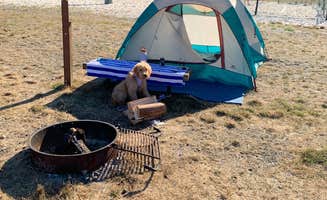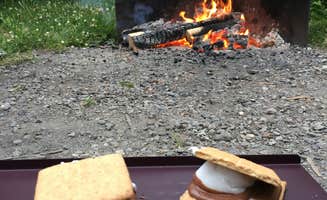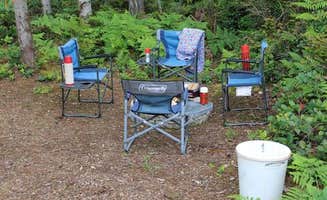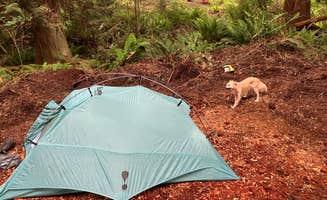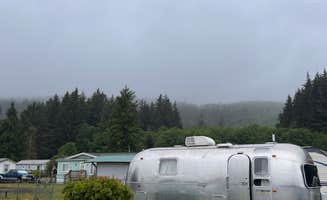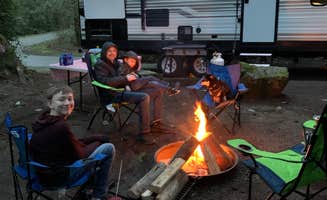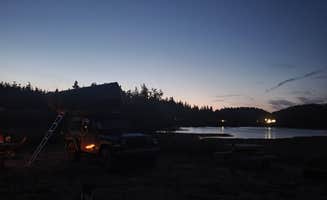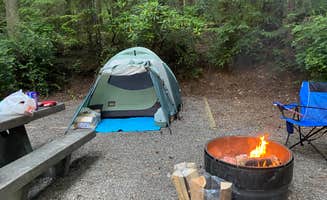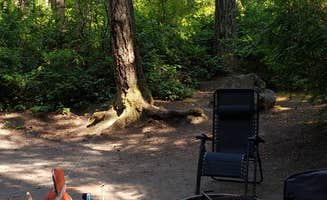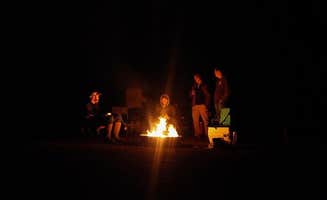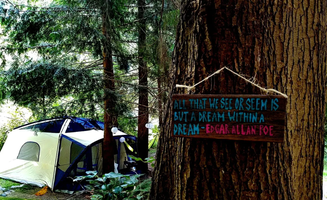Kingston offers excellent waterfront camping options on Washington's Kitsap Peninsula with both state parks and forest service campgrounds accessible year-round. The region features a temperate marine climate with mild winters averaging 45°F and summers rarely exceeding 80°F. Most campsites in the area sit at elevations between 0-300 feet, with many providing direct water access to either Puget Sound or Hood Canal.
What to do
Kayaking at Fay Bainbridge Park: Launch directly from the beach at this Bainbridge Island campground. "Great campground right on the beach. Clean facilities," reports Brook M., while another camper mentions the "stunning views of the Puget Sound" that make this location perfect for paddlers.
Wildlife viewing at Dosewallips: Visit this Hood Canal campground for abundant wildlife spotting opportunities. "Every night, my husband and I would walk to the wildlife viewing platform to see lots of birds, or walk down by the river and see lots of elk and bald eagles," notes Amy & Stu B. The campground features several hiking trails accessible directly from camp.
Shellfish harvesting on Hood Canal: Collect oysters and clams at Seal Rock Campground. "Great for shrimping, clamming and oyster hunting. The oysters are so abundant and you are able to crack open a few and eat them there on the beach!" explains Mary C. A shellfish license is required and costs $13-25 depending on species.
Beach exploration at Manchester: Discover military history and beach trails at Manchester State Park. "Very well maintained! A quick walk to the beach, old torpedo building, trails. We had a great time taking a little hike along the water," writes Heather M. The park features a small rocky beach only accessible during lower tides.
What campers like
Privacy between sites: Many Scenic Beach State Park campers appreciate the vegetation and layout. "This campground is unique in how private the sites are with an unusual amount of foliage between sites," notes Jeannie P. Another camper adds, "The sites are all secluded and tucked into the woods."
Waterfront access: Direct water access ranks high among Kitsap Memorial State Park visitors. "The property itself is great. There's a playground and a couple large open fields for kids to play. Also really close to the water which is cool," explains Kris W. Most waterfront sites require early booking.
Spacious campsites: Larger than average sites appear frequently in reviews of Fort Flagler. "Spacious campground compared to most. Great views and several trails," writes Jack P. Another camper adds, "From arriving to leaving it was a great experience. Beach front camping, old fort to explore, and endless outdoor opportunities."
Convenient locations: Many campers value proximity to services. Lake Pleasant RV Park offers "laundry machines ($2 washer/$2 dryer)" according to John M., who adds it's "Close to Seattle, feels secluded, but you can walk or take a short drive to restaurants, groceries, anything you could want or need."
What you should know
Campsite proximity varies greatly: While some campgrounds offer privacy, others place sites close together. At Fort Flagler Historical State Park, "Camping at the upper (wooded) site is the quieter of the two campsites," advises Ryan L. At Kitsap Memorial, "The camper spots are really close together" according to Nicole R.
Road noise impacts some sites: Highway proximity affects certain campgrounds. At Seal Rock, one reviewer noted "noisy, rude host, dirty, nice canal, easy access" and explained "we slept poorly that night because the traffic from 101 is VERY near and pretty constant."
Off-season advantages: Winter camping offers quieter experiences and better availability. "Awesome fall and winter camping. First come first serve after Oct 31st. No problem finding 2 sites side by side for 40 ft rigs," reports Mike K. about Fort Flagler. Most facilities remain open, though some upper campgrounds close seasonally.
Waterfront site limitations: Beach access doesn't guarantee site privacy. At Fay Bainbridge, "Very tight camping sites, no privacy, plenty of noise in summer, especially if you're across from the playground, lots of cars going by," notes Judy J.
Tips for camping with families
Playground access: Camano Island State Park offers excellent facilities for groups with children. "Stayed in the group site with my daughter's American Heritage Girls troop. We had 22 girls and there was plenty of room," reports Bridget S. The park features "a terrific pebble beach" according to Jeff K.
Beach activities: Scenic Beach State Park provides family-friendly waterfront options. "The kids loved the playgrounds and the beach, which had great views of the Hood Canal and the Olympics," writes Brown Sign Junkies. Bring appropriate footwear as most beaches are rocky rather than sandy.
Wildlife encounters: Plan morning wildlife viewing with kids at Dosewallips. "We went from Sunday to Tuesday to avoid the crowd and actually get a decent campsite which we did," notes Michael B., who visited with his "wife, six year old, one year old, and dog." The campground provides river access directly from many sites.
Historical exploration: Fort-based campgrounds offer educational opportunities. At Fort Flagler, "We did the tour and it was very informative. Lots of history and there are even a few geocaches. There is also a museum," explains Jill T., making it perfect for curious children.
Tips from RVers
Site selection strategy: At Lake Pleasant RV Park, "Some spots are tighter than others and we watched a couple people spend some time backing in their rigs. We had a pull through and, while it wasn't a huge amount of space, the trees between spots offered a really nice level of privacy," advises Kristin S.
Water pressure considerations: Bring a pressure regulator for some campgrounds. "Water pressure is low, averaging just over 20psi" at Kitsap Memorial according to K D., who notes "RV sites 1, 2, 4, 9, and 11 will be easier to back in to. The other full hook up sites are 90° approaches."
Seasonal occupancy rules: Check long-term stay policies before planning extended visits. At Lake Pleasant, "During the peak season all monthly visitors have to move on to other parks or pay triple the price," explains Dene H. who stayed during the off-season while attending university.


